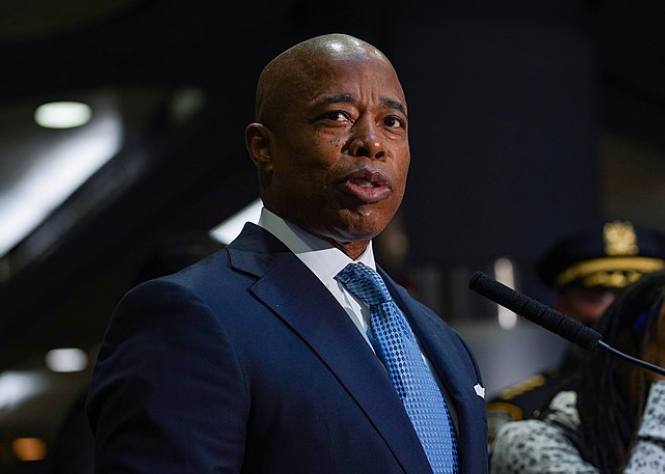A federal judge has permanently dismissed the corruption case against New York City Mayor Eric Adams, barring the Department of Justice (DOJ) from refiling the charges.
The ruling has sparked widespread legal and political discussions, given its implications for the separation of powers and prosecutorial discretion.
Judge’s Ruling and Its Impact
U.S. District Judge Dale Ho issued a decision to dismiss the charges with prejudice, preventing the DOJ from reintroducing the case in U.S. District Court in Manhattan. The ruling marks a significant moment in the case, as the DOJ had requested a dismissal without prejudice, which would have allowed them to potentially refile the charges in the future.
In his strongly worded 78-page opinion, Judge Ho criticized the DOJ’s reasoning, highlighting concerns over the department’s motives for seeking a dismissal. The ruling suggested that the dismissal was tied to broader political considerations rather than purely legal grounds. The judge stated:
“Everything here smacks of a bargain: dismissal of the indictment in exchange for immigration policy concessions.”
This statement underscores the concern that the DOJ’s decision might have been influenced by political agreements rather than the pursuit of justice. Ho further stated that the government’s position implied that public officials could receive special treatment if they aligned with federal political priorities, which he deemed “fundamentally incompatible with the basic promise of equal justice under the law.”
Allegations Against Mayor Adams
Adams was indicted in September 2024 on multiple charges, including bribery, wire fraud, conspiracy, and soliciting campaign contributions from foreign nationals in exchange for political favors.
The allegations stemmed from his tenure as Brooklyn Borough President, during which prosecutors claimed he accepted luxury travel perks from a Turkish official. In return, Adams allegedly pressured a New York City Fire Department official to approve permits for a Turkish consular building that had failed safety inspections.
Adams has consistently maintained his innocence. Following the dismissal, he stated:
“This case should have never been brought, and I did nothing wrong.”
His legal team echoed this sentiment, arguing that the prosecution was politically motivated and lacked substantial evidence.
DOJ Resignations and Internal Conflict
The DOJ’s attempt to dismiss the case led to internal turmoil, prompting the mass resignation of several officials. Among them was Danielle Sassoon, the then-acting U.S. Attorney for the Southern District of New York, who resigned in protest.
In her resignation letter, Sassoon alleged that Adams’ legal team had implied a quid pro quo, suggesting that Adams would assist in enforcing federal immigration policies in exchange for the charges being dropped.
Paul Clement, a conservative attorney appointed by the court to assess the DOJ’s request, recommended that the case be dismissed with prejudice to eliminate any perception that Adams’ political actions could influence his legal standing. In his report, Clement noted:
“A dismissal without prejudice creates a palpable sense that the prosecution outlined in the indictment and approved by a grand jury could be renewed, a prospect that hangs like the proverbial Sword of Damocles over the accused.”
Judge Ho ultimately aligned with Clement’s recommendation, stating that permanently dismissing the case was necessary to ensure government accountability and public trust.
Political Ramifications and Adams’ Re-Election Bid
With the case behind him, Adams has announced his candidacy for re-election as an independent, setting up a high-stakes race against opponents including former Governor Andrew Cuomo.
The ruling eliminates a major legal hurdle for Adams, but questions remain about the broader implications of the case, particularly regarding political influence in federal prosecutions.
Rev. Al Sharpton, a prominent civil rights leader, commented on the case’s conclusion, stating:
“It takes away the feeling that he was under the thumb of the president. It clearly says that now, whatever he does, he’ll be judged on his own decisions.”
Key Legal Takeaways
- Dismissal With Prejudice: The ruling permanently blocks the DOJ from refiling charges against Adams, ensuring that he cannot be prosecuted for the same allegations in federal court.
- Political Influence in Prosecutions: The case highlights concerns about the intersection of law enforcement and political priorities, particularly regarding immigration enforcement policies under the Trump administration.
- Judicial Oversight of DOJ Decisions: Judge Ho’s ruling reinforces the judiciary’s role in maintaining checks and balances over prosecutorial discretion, ensuring that dismissals are not used as political bargaining tools.
- Precedent for Future Cases: This case may serve as a legal precedent for how courts handle requests to dismiss cases involving high-profile political figures, particularly when the dismissal appears politically motivated.
Conclusion
Judge Ho’s ruling in United States v. Adams underscores the complex relationship between law, politics, and prosecutorial discretion. While Adams is now free to continue his political career without the shadow of prosecution, the case raises significant questions about the integrity of federal prosecutions and the extent to which political considerations should influence legal proceedings.
This case will likely be studied for its implications on judicial independence, prosecutorial ethics, and the future of political corruption investigations in the United States.

